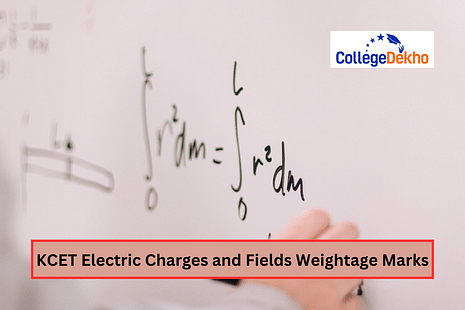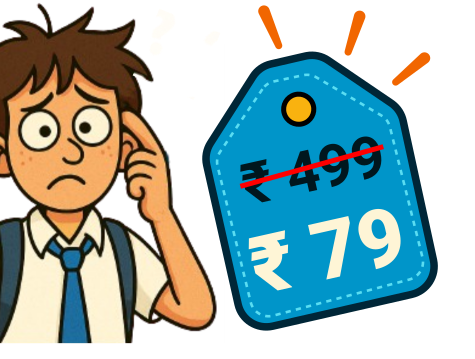
KCET Electric Charges and Fields Weightage Marks 2025 is 3 to 4% of the total weightage of the Physics syllabus and 2 to 3 questions can be expected to be asked in the KCET 2025 exam. As per previous years' analysis, KCET Electric Charges and Fields Weightage are considered moderate. Some of the important topics of KCET Electric Charges and Fields from Physics include Electric Field, Coulomb's Law, Electric Potential, Capacitors, Gauss's Law, Electrostatic Potential Energy of a System of Charges, Dielectrics, etc.
As per
KCET syllabus 2025
, Electric Charges and Fields is considered an easy topic as it mostly covers formula-based questions, conceptual clarity, and fewer complex calculations. Electric charges and fields are a fundamental topic of electromagnetism which forms the basis of understanding electric fields, electric forces, their reactions and interactions. In this article, we have discussed KCET Electric Charges and Fields Weightage Marks 2025 along with important sub-topics and sample questions to boost the preparation.
Quick Links:
Check Also:
KCET 2025 Exam Pattern
Expected KCET Electric Charges and Fields Weightage Marks 2025
As per previous years' analysis based on the KCET question papers, the sub-topic that holds the highest weightage from the KCET Electric Charges and Fields topic is Electric Field with an approximate weightage of 20 to 25%. Check the detailed expected KCET 2025 Electric Charges and Fields Weightage here.
Sub-topic | Approximate Weightage |
|---|---|
Electric Field | 20 to 25% |
Electric Potential | 15 to 20% |
Coulomb's Law | 10 to 15% |
Capacitors | 10 to 15% |
Gauss's Law | 10 to 15% |
Electrostatic Potential Energy | 5 to 10% |
Dielectrics | 5 to 10% |
Note-
Candidates should consider this data as a reference as it is extracted from
Previous Years KCET Question Papers
. However, we will update the exact weightage after KCET 2025 is concluded.
Also Check -
KCET Subject Wise Syllabus 2025
Important Topics of KCET Electric Charges and Fields
Some of the important subtopics of KCET Electric Charges and Fields are listed below.
Topics | Subtopics of Electric Charges and Fields |
|---|---|
Coulomb's Law |
|
Electric Field |
|
Electric Potential |
|
Capacitors |
|
Gauss's Law |
|
Electrostatic Potential Energy of a System of Charges |
|
Dielectrics |
|
Note- Candidates should consider this data as a reference as it is extracted from previous years KCET Question Papers. However, we will update the exact list of topics after the exam is concluded.
Check Also:
KCET Physics Syllabus 2025
KCET Electric Charges and Fields Sample Questions
Candidates preparing for the KCET 2025 Physics exam can find the Electric Charges and Fields Sample Questions below.1. Which statement among the following is false regarding Gauss’s law?
(a) When a system exhibits symmetry, Gauss’s law may not be beneficial for calculating the electrostatic field.
(b) In Gauss’s law, the term “q” on the right side of the equation represents the total charge enclosed within the surface.
(c) Gauss’s law holds for any closed surface.
(d) Gauss’s law is derived from Coulomb’s law, which contains an inverse square dependence on distance.
Answer: (a) When a system exhibits symmetry, Gauss’s law may not be particularly useful for calculating the electrostatic field.
2. Assume a system inside which there are different types of charges, but the total charge is practically zero. At points outside the given region
(a) The electric field must be zero.
(b) The electric field is caused solely by the dipole moment of the charge distribution.
(c) If a charged particle is moved along a closed path away from a region, the work done will not be zero.
(d) For large distances (r) from the origin, the dominant electric field is inversely proportional to r3.
Answer: (d) For large distances (r) from the origin, the dominant electric field is inversely proportional to r3.
3. The quantisation of charge implies that
(a) Charges cannot be destroyed
(b) It is not possible for a charge to be a fraction of the charge on an electron.
(c) Charge exists on particles, and there is a minimum allowable charge for a particle.
Answer: (b) It is not possible for a charge to be a fraction of the charge on an electron.
4. If a parrot sits on a bare high-voltage power line, it will -
(a) Receive a strong shock
(b) Receive a mild shock
(c) Be killed instantly
(d) Not be affected significantly.
Answer: (d) Not be affected significantly
Solve:
KCET Sample Paper
5. If two conducting spheres are charged separately and then connected, the following may occur:
(a) The electrostatic energy of the spheres will be conserved.
(b) Both the electrostatic energy and charge will be conserved.
(c) The total charge on the spheres is conserved
(d) None of the above.
Answer: (c) the total charge on the spheres is conserved
Related Articles:
Are you feeling lost and unsure about what career path to take after completing 12th standard?
Say goodbye to confusion and hello to a bright future!

FAQs
The weightage of Electric Field in KCET Electric Charges and Fields is 20 to 25%.
Some of the important topics of KCET Electric Charges and Fields from Physics are Electric Field, Coulomb's Law, Electric Potential, Capacitors, Gauss's Law, Electrostatic Potential Energy of a System of Charges, Dielectrics, etc.
KCET 2025 Electric Charges and Fields Weightage Marks is expected to be around 3 to 4% of the total Physics portion which is equivalent to 2 to 3 questions in the KCET 2025 exam.
Was this article helpful?




















Similar Articles
Punjab B.Tech Admissions 2025 - Dates (Released), Registration (Started), Eligibility, Choice Filling, Rank List, Counselling, Seat Allotment
Top TS ECET 2025 Participating Colleges: Check opening & closing ranks
Who is Eligible for TS ECET 2025 Final Phase Counselling?
TS ECET 2025 Slot Booking for Certificate Verification – Dates, Time, Process
List of Documents Required for Reporting after TS EAMCET Seat Allotment 2025
List of Documents Required for TS ECET Counselling 2025